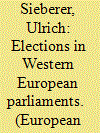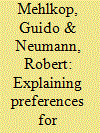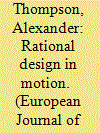|
|
|
Sort Order |
|
|
|
Items / Page
|
|
|
|
|
|
|
| Srl | Item |
| 1 |
ID:
046079


|
|
|
|
|
| Publication |
Cheltenham, Edward Elgar, 2001.
|
| Description |
xix, 566p.
|
| Standard Number |
1840644257
|
|
|
|
|
|
|
|
|
|
|
|
Copies: C:2/I:0,R:0,Q:0
Circulation
| Accession# | Call# | Current Location | Status | Policy | Location |
| 047006 | 320.011356/ECO 047006 | Main | On Shelf | General | |
| 047007 | 320.011356/ECO 047007 | Main | On Shelf | General | |
|
|
|
|
| 2 |
ID:
120510


|
|
|
|
|
| Publication |
2013.
|
| Summary/Abstract |
Parliaments often elect holders of important extra-parliamentary offices such as heads of state, constitutional judges, heads of audit institutions and ombudsmen. What drives the behaviour of parliamentary actors and the outcome of such elections? This article explains actor behaviour theoretically, drawing on spatial factors, principal-agent arguments about the importance of nonspatial candidate characteristics and signaling arguments about competitive considerations beyond the specific election. Empirically, it provides the first comparative analysis of such elections outside the United States Senate using original data on 100 elections for four external offices in 14 Western European parliaments. The findings show that spatial variables, nonspatial candidate characteristics and features of the competitive context systematically affect the election outcome. The article contributes to comparative parliamentary research in general by demonstrating how parliamentary activities, other than lawmaking, can be analysed using established theories and by showing that consensual aggregate outcomes can be explained within a competition-based rational choice model.
|
|
|
|
|
|
|
|
|
|
|
|
|
|
|
|
| 3 |
ID:
100928


|
|
|
|
|
| Publication |
2010.
|
| Summary/Abstract |
The ongoing disputes between Russia and its neighbouring states vis--vis the critical transmission of primary energy resources to the remainder of the European continent has led Brussels to place the matter squarely within the scope of European Union (EU) energy security policy. EU-Russia energy negotiations have more often than not displayed patterns of rationalism with an ingrained cost-benefit orientation. Notwithstanding, this incidence has been complicated by the reality of changing geo-political constellations in Central and Eastern Europe in the course of the past two decades. This has influenced the political landscape of EU-Russia negotiations concerning projects under construction, as well as proposed others on the continent, such as Nord Stream (bypassing Belarus and Poland) and South Stream (bypassing Ukraine). Given such considerations, we observe that the Czech Presidency of the Council of the EU in the first half of 2009 has shown greater leniency towards Ukraine, Belarus and Poland than the general consensus in EU-Russia energy talks maintained in Brussels would have otherwise provided for. We also observe that France and Germany are driven by a greater rational self-interest in their conduct of EU energy security policy. In consequence, Russia's awareness of the divergent dispositions amongst the EU Member States becomes the dependent variable in our analysis. Thus, the primary question that this paper poses is whether rational cost-benefit orientations in individual EU Member States can lead to collective bargaining outcomes in EU-Russia energy negotiations.
|
|
|
|
|
|
|
|
|
|
|
|
|
|
|
|
| 4 |
ID:
111906


|
|
|
|
|
| Publication |
2012.
|
| Summary/Abstract |
Explanations of different patterns of preferences for redistribution either highlight the role of the institutional framework in a country or highlight the importance of self-interest and rational expectations. The study introduces a unified approach to explain differences in preferences for redistributive measures for the case of intergenerational monetary transfers for families and children. Both explanatory approaches are integrated into the action-based Model of Frame Selection that incorporates normative motives and economic self-interest into the process of decision making. Using a large sample that deals with questions on the approval of public policies for families and accounts for the normative importance of children and family life in Germany, evidence is provided that both approaches are valid in explaining preferences for government transfers.
|
|
|
|
|
|
|
|
|
|
|
|
|
|
|
|
| 5 |
ID:
190051


|
|
|
|
|
| Summary/Abstract |
The discussion of Iran’s antisemitism and anti-Zionism has been separated from the debate on the Islamist regime’s nuclear project. A synthesis of the issues is needed given that both are the core of the regime’s foreign policy. Some observers consider the regime’s antisemitism and anti-Zionism – promising Israel’s destruction – to be eliminationist. Most others, however, argue that the rhetoric is performative, designed to bolster the Shiite theocracy in a predominantly Sunni region. While the debate cannot be settled, it is well known that nuclear warfare does not allow for a margin of error in predictions. Should the advocates of performative anti-Zionism be wrong, millions of Jews and others would die.
|
|
|
|
|
|
|
|
|
|
|
|
|
|
|
|
| 6 |
ID:
163318


|
|
|
|
|
| Summary/Abstract |
Since the 1980s, Japan’s war memory has strained its relations with South Korea and China, to a less degree, the USA. Two of the thorniest issues are the comfort women and the US atomic bombing of Japan. Before the Obama administration announced its policy pivot to Asia in 2011, both Japanese and American leaders were reluctant to make amends for the past acts of their countries. However, in 2015, the Japanese conservative Prime Minister Abe reached an agreement with South Korea that “finally and irreversibly” resolved the comfort women issue, thus achieving a historic reconciliation between the two countries. In 2016, then President Obama visited Hiroshima to commemorate the atomic bomb victims. Then, in December 2016, the comfort women issue resurfaced in Japan and South Korea relations, indicating a failure of the reconciliation. Why did the USA change its policy on historical issues involving Japan? Why did Abe and the South Korean President Park Geun-hye settle the comfort women issue? Why did Obama visit Hiroshima? Why did the reconciliation fail? In this article, I propose a rational choice theory to answer these questions. Applying the proposed theory and relying on available evidence, I argue that the settlement of the comfort women issue and Obama’s visit to Hiroshima are important components of Obama’s pivot to Asia to balance China’s rise. The reconciliation failed mainly because it did not resolve the historical justice issue promoted by the human rights norms. I discuss some implications for reconciliation in Northeast Asia.
|
|
|
|
|
|
|
|
|
|
|
|
|
|
|
|
| 7 |
ID:
046931


|
|
|
|
|
| Publication |
Cambridge, MIT Press, 2000.
|
| Description |
xix, 124p.
|
| Standard Number |
0262522766
|
|
|
|
|
|
|
|
|
|
|
|
Copies: C:1/I:0,R:0,Q:0
Circulation
| Accession# | Call# | Current Location | Status | Policy | Location |
| 044228 | 327.101/BRO 044228 | Main | On Shelf | General | |
|
|
|
|
| 8 |
ID:
138775


|
|
|
|
|
| Summary/Abstract |
Suicide terrorism is the most violent and horrifying form of terrorism in the world today. This kind of terrorism causes many fatalities and can throw an entire nation into a state of panic. We usually attribute this kind of terrorism to altruistic motivation, assuming that bombers are willing to sacrifice themselves for a higher cause. The current study uses the criminological theory of Rational Choice to analyze the motivation of jihadist suicide terrorism. By reviewing the religious, personal, and social incentives, we demonstrate that even those who kill themselves in suicide attacks, which are seemingly examples of irrational or altruistic behavior, do so while considering future, self-gratifying benefits. Since this self-destructive behavior is mostly driven not by altruistic motivation but by the anticipation of costs and benefits, we find that there is no fundamental difference between the perpetrators’ motivations and those of other criminals; both groups are committed to maximizing self-gratifying, beneficial behavior.
|
|
|
|
|
|
|
|
|
|
|
|
|
|
|
|
| 9 |
ID:
097735


|
|
|
|
|
| Publication |
2010.
|
| Summary/Abstract |
Recent International Relations scholarship offers valuable rational choice explanations for the design of international institutions. However, the rational design literature has relied heavily on institutional outcomes as evidence for testing models. Such studies must be complemented by research designs that analyze the decisions and bargaining that drive design choices in order to expose causal mechanisms and test a wider range of observable implications. I assess an important rational design hypothesis, that uncertainty leads to flexible institutions, by analyzing the negotiations behind the climate change regime and by considering two distinct institutional outcomes across time. While the hypothesis receives considerable support, significant behavior and outcomes do not conform to its logic. I propose refinements for rational design theory in general and work on uncertainty and flexibility in particular. Rational choice theory speaks to the process of institutional design and should not content itself with predicting - and testing itself against - equilibrium outcomes.
|
|
|
|
|
|
|
|
|
|
|
|
|
|
|
|
|
|
|
|
|